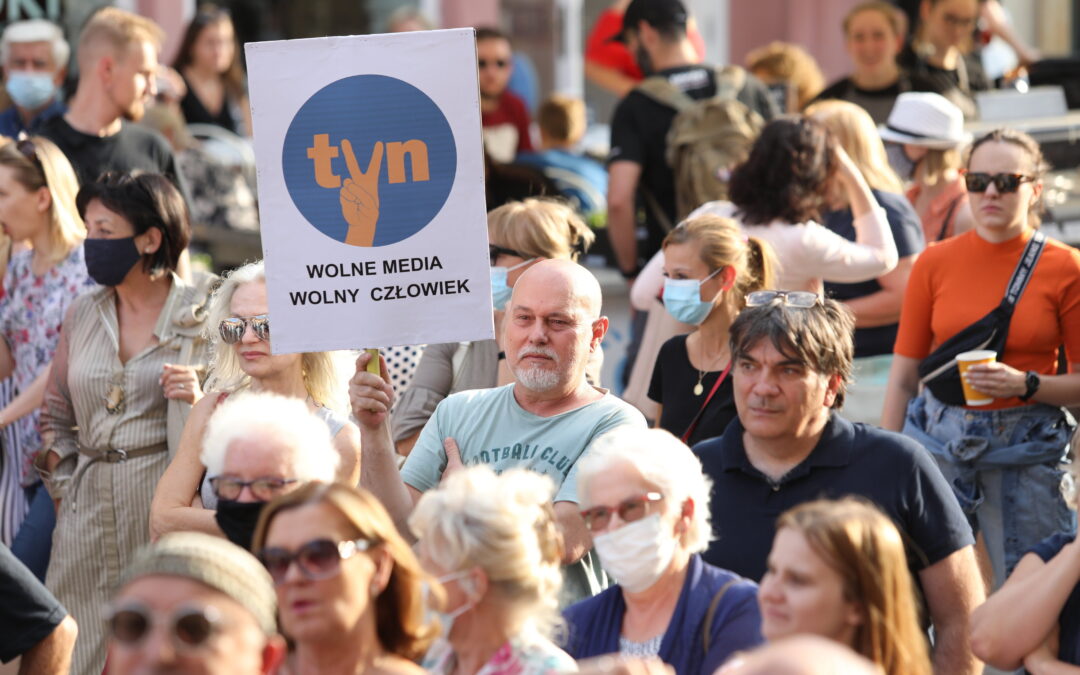The 24-hour news channel of TVN, Poland’s largest private television network, has received a broadcasting licence in the Netherlands amid concerns that its Polish one, which expires next month, may not be renewed.
The development comes after Poland’s parliament approved legislation that would restrict foreign ownership of Polish media. The move is seen to be aimed in particular at the American-owned TVN, whose coverage is often critical of the government.
The Dutch licence would allow TVN24 to continue broadcasting “in accordance with Polish and EU law” if it did not receive a renewal of its local concession from Poland’s National Broadcasting Council (KRRiT), a state regulator, said Kasia Kieli of Discovery, Inc., which owns TVN.
TVN24 applied to renew its licence in Poland over 18 months ago, but has yet to receive a decision from KRRiT, which is seen as being under government influence. The council’s most recent votes on the issue, which took place last Thursday, were indecisive.
KRRiT’s indecision is linked to broader questions over TVN’s ownership structure. Discovery got around a ban on non-European firms owning more than 49% of Polish media companies by using a subsidiary in the Netherlands.
The legislation recently submitted by Poland’s ruling national-conservative Law and Justice (PiS) party and approved by parliament last week would seek to close this loophole. Many observers, however, believe that it is an effort by the government to silence a critical outlet.
Even if TVN24’s licence is renewed, or it manages to broadcast through the Netherlands, the new legislation, if introduced, would impact on TVN’s operations more broadly, including possibly forcing Discovery to sell its majority stake.
“This [Dutch] licence does not in any way solve the situation we have with the new law passed in the government,” said Kieli, who oversees Discovery’s operations in Europe, the Middle East and Africa. “The future of TVN and freedom of press in Poland is still at risk.”
The bill has now gone to the upper house of parliament, the opposition-controlled Senate, which can delay its passage for 30 days but not prevent it if there is an absolute majority in the more powerful lower-house Sejm.
Should the legislation clear parliament, it would then also need to be signed by the president, Andrzej Duda. Some believe that Duda hinted at a veto yesterday, saying he would “uphold the constitutional principles [of] freedom of speech and freedom of business”, reports Radio Zet.
The law has sparked tensions with the United States, one of Poland’s most important allies, with Secretary of State Anthony Blinken saying Washington was “deeply troubled” by the legislation, which “would significantly weaken the media environment the Polish people have worked so long to build”.
PiS, however, has argued that the legislation would prevent entities from countries such as Russia and China from buying Polish media firms. The party’s chairman, Jarosław Kaczyński, claimed that it would stop “narco-businesses” from buying outlets to “launder dirty money”.
Main image credit: Jakub Orzechowski / Agencja Gazeta

Maria Wilczek is deputy editor of Notes from Poland. She is a regular writer for The Times, The Economist and Al Jazeera English, and has also featured in Foreign Policy, Politico Europe, The Spectator and Gazeta Wyborcza.




















